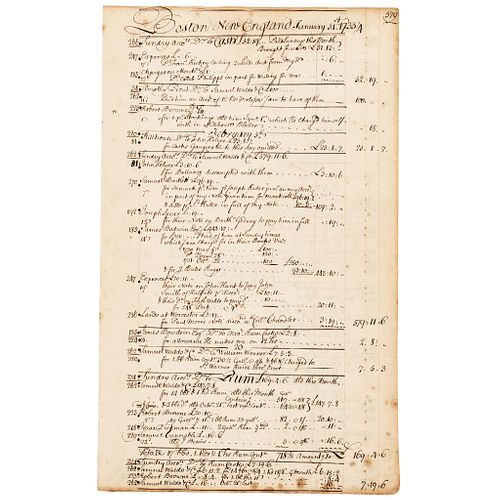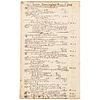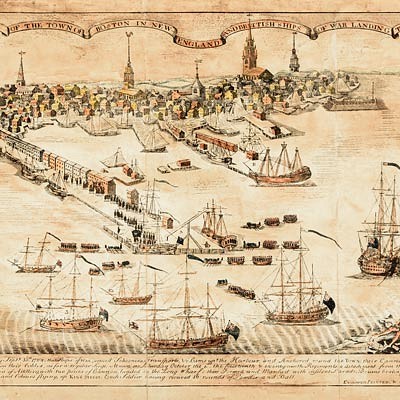1733/4 Manuscript Ledger of Cornelius Waldo, written at Boston New England
Lot 108
Categories
Estimate:
$600 - $800
Absentee vs Live bid
Two ways to bid:
- Leave a max absentee bid and the platform will bid on your behalf up to your maximum bid during the live auction.
- Bid live during the auction and your bids will be submitted real-time to the auctioneer.
Bid Increments
| Price | Bid Increment |
|---|---|
| $0 | $10 |
| $200 | $20 |
| $300 | $25 |
| $500 | $50 |
| $1,000 | $100 |
| $2,000 | $200 |
| $3,000 | $250 |
| $5,000 | $500 |
| $10,000 | $1,000 |
| $20,000 | $2,000 |
| $30,000 | $2,500 |
| $50,000 | $5,000 |
| $100,000 | $10,000 |
| $200,000 | $20,000 |
| $300,000 | $25,000 |
| $500,000 | $50,000 |
About Auction
By Early American History Auctions
Mar 20, 2021
Set Reminder
2021-03-20 12:00:00
2021-03-20 12:00:00
America/New_York
Bidsquare
Bidsquare : Autographs-Colonial-Political-Americana
https://www.bidsquare.com/auctions/early-american-history-auctions/autographs-colonial-political-americana-6509
330 Lots of Rare, Historic Autographs, Americana, Civil War Era, George Washington, Abraham Lincoln, Slavery & Black History, Revolutionary War Era, Colonial America, Federal Period, War of 1812, Colonial Currency, Indian Peace Medals & more... Early American History Auctions auctions@earlyamerican.com
330 Lots of Rare, Historic Autographs, Americana, Civil War Era, George Washington, Abraham Lincoln, Slavery & Black History, Revolutionary War Era, Colonial America, Federal Period, War of 1812, Colonial Currency, Indian Peace Medals & more... Early American History Auctions auctions@earlyamerican.com
- Lot Description
Colonial America
1733 Boston New England Early Colonial Era Ledger Pages
January 31st/February 22nd, 1733/4 to March 2nd-Dated Early American Colonial Era, Manuscript Document Ledger Pages of Merchant Cornelius Waldo, Headed "Boston New England," Choice Very Fine.
This impressive handwritten 2-Page (back to back on one sheet) Manuscript Document are Ledger Pages from Cornelius Waldo in the Massachusetts Bay Province. This Document is written in "Boston New England", describing the various payments made for molasses and rum, some people owing money and others he owed money to and/or paid, as well as his payment to help build the first Court House in Worcester County, Massachusetts. This legal size ledger sheet measures 8" x 12.5" boldly written in rich brown ink on clean crisp laid period paper having a large central decorative watermark within as made. The text is easily readable with some minor tone at the extreme bottom edge. One of the more interesting entries is on the second page at middle, further dated March 2nd stating: "To William Shirley Esqr. 15.. My Prom(ise) to pay him 15" showing his repayment of that debt. William Shirley (1694-1771), was then 38 years old, later to become Governor of Massachusetts (1741-56). In 1731 he emigrated, with his family, to Massachusetts and in 1741, through the influence of the Duke of Newcastle, he was appointed Governor of Massachusetts. Of note, he (was the one) who conceived the project of attacking Louisbourg in 1745 and in 1755 he was given Command of the Expedition against Niagara. After the death of Braddock, he was appointed Commander-in-Chief of the British forces in North America. William Shirley died at Shirley Place, Roxbury, Massachusetts, on March 24, 1771. Also mentioned by entry is James Davenport (1716-1757) a noted early American clergyman and James Bowdoin, a wealthy Boston merchant and father of the second Royal Governor of Massachusetts, Timothy Prout along with others certainly worthy of further research.
Cornelius Waldo was a twin, born with his brother Jonathan on November 17, 1684, in Dunstable, Massachusetts, to Cornelius (before 1657-before 1697) and Faith Peck Jackson Waldo (1658-1732). He was baptized at the First Church in Boston in 1692. On August 28, 1711, he wed Faith Savage, daughter of Thomas and Elizabeth (Scottow) Savage of Boston. She was pregnant with their first child at the time, which led one genealogist to adjust the marriage date to 1710. They had nine children, including Daniel Waldo, who established the family in Worcester in 1782.
Cornelius Waldo was a prosperous merchant, distiller, and landowner who held property in Boston and elsewhere in Massachusetts, and in (later) Maine. According to family tradition, he was apprenticed to the Boston merchant John Oulton, who was later Waldo's business partner. In 1721 Oulton and Waldo imported "Canary Wines," which they sold "by the Pipe or Quarter Cask."
In 1734 Cornelius formed a brief partnership with his cousin Samuel, selling Madeira wine, which they had shipped from St. Kitts, by the pipe, hogshead, or quarter cask (Samuel would later go on to fame for his role as Second in Command to Sir William Pepperrell in the attack on the French at Louisbourg.)
In addition to his merchant trade, Waldo established a distilling business in Boston. In 1722 he leased land from John Leverett and obtained permission to erect a still house. In 1738 he was selling rum, probably of his own manufacture, by the hogshead, barrel, and quarter cask.
By 1743 his operations included several wells, a building at least forty feet long, a "Rum House and Engine that his Horse goes in to pump the Water," and a stable built over one of the wells. His works included "Stills" and "a mighty Worm Tub" that covered enough ground to fit a "Stable for two Horses & Hay to feed them.
In 1719 he was a partner with his uncle Jonathan and Jonathan's son-in-law Thomas Fairweather as one of twenty associate owners (along with ten original proprietors) of the "Muscungus Patent," a vast tract of land in Maine that once encompassed a million acres. Cornelius's cousin Samuel would eventually own half of these acres.
The land Waldo bought in Worcester County in partnership with John Oulton and Thomas Palmer was divided in 1727, when the partnership was dissolved. In 1733 he purchased a farm in Watertown; he would later offer to lease the back part of the dwelling to "a good Husbandman" and the front part of the house with "Gardens and other Accommodations, to a Gentleman for a Country Seat." At the time of his death, Waldo owned land in Rutland, Worcester, Holden, Watertown, and Plymouth.
William Shirley (1694-1771), Governor of Massachusetts (1741-56), was born at Preston, Sussex, England, on December 2, 1694. He was educated at Pembroke College, Cambridge (B.A., 1715), was called to the bar in 1720, and for eleven years practised law in London. In 1731 he emigrated, with his family, to Massachusetts ; and in 1741, through the influence of the Duke of Newcastle, he was appointed Governor of Massachusetts. He [was the one] who conceived the project of attacking Louisbourg in 1745 ; and in 1755 he was given command of the expedition against Niagara. After the death of Braddock, he was appointed Commander-in-Chief of the British forces in North America ; but the failure of his expedition against Niagara brought about his recall in 1756. In 1761 he was appointed governor of the Bahamas ; but in 1767 he relinquished this post, and returned to Massachusetts. He died at Shirley Place, Roxbury, Massachusetts, on March 24, 1771.
Our Auction Contents:
Black History & Slavery: (Lots 1 - 63)
Abraham Lincoln Related: (Lots 64 - 74)
Historic Autographs: (Lots 75 - 235)
Colonial America: (Lots 236 - 261)
Revolutionary War: (Lots 262 - 304)
George Washington Related: (Lots 305 - 306)
Early American Guns & Weapons: (Lots 307 - 318) - Shipping Info
-
Early American provides in-house worldwide shipping. Please contact us directly if you have questions about your specific shipping requirements.
-
- Buyer's Premium



 EUR
EUR CAD
CAD AUD
AUD GBP
GBP MXN
MXN HKD
HKD CNY
CNY MYR
MYR SEK
SEK SGD
SGD CHF
CHF THB
THB












